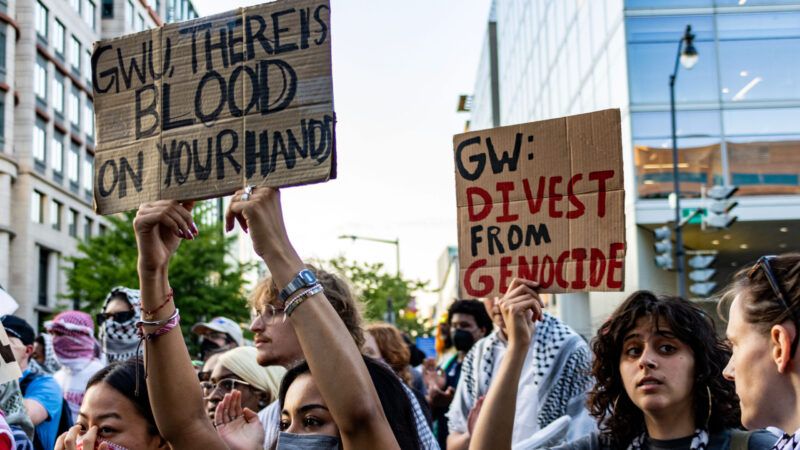The Israeli-Palestinian Conflict Has Fueled a Surge in Campus Censorship
The portion of college students who say it's OK to shout down campus speakers is rising, according to a new survey.

Last year, student-led protests over the Israel-Hamas war broke out at dozens of college campuses. With the new school year well underway, student demonstrations have begun again in earnest.
While many students expressed their opposition to the war in Gaza through peaceful means, some protests devolved into property destruction, trespassing, and even violence on a handful of college campuses, including at some of America's most elite universities. Many students erected large encampments claiming public space on campuses—a form of protest that colleges are generally free to limit under reasonable time, place, and manner restrictions.
According to the Foundation for Individual Rights and Expression (FIRE), attempts to deplatform speakers were surging by this April. Of the 67 attempts it had recorded from January to mid-April, 73 percent involved controversy surrounding the Israeli-Palestinian conflict. So how did a year of raucous—and occasionally disruptive and destructive—protest affect student opinions on free speech?
In September, FIRE released its fourth annual College Free Speech Rankings. The survey, which polled almost 60,000 undergraduates from more than 250 colleges, asked students a wide range of questions about free speech and the campus climate affecting it. The survey—as in past years—also asked questions about whether they would find it acceptable for students to engage in various kinds of disruptive protests of a hypothetical controversial speaker on campus.
About 37 percent of respondents agreed it was "sometimes" or "always" acceptable for students to shout down a campus speaker; last year, only 31 percent said the same. In all, fewer than one in three students said that it would "never" be acceptable to shout down a speaker.
Less than half of all students said it was "never" acceptable to protest by blocking other students from attending a controversial speech—a decline from last year's 55 percent. Nearly one in three said they would support violence to stop a campus speech in at least some circumstances. In 2023, only 27 percent of students said the same.
These results don't necessarily show the percentage of students who would engage in these activities themselves—rather, they reveal the proportion of students who might condone actions from other students that restrict speech.
The rising support for disruptive and even violent tactics among college students is a disturbing shift. Increased protests over the Israeli-Palestinian conflict likely accelerated this trend, but the data show that students' tolerance for censorship and obstruction has been growing for some time. This year, only 48 percent of students said it was never acceptable to block other students from attending a campus speech. In 2022, upwards of 62 percent of students said as much.
While the latest Israel-Hamas war is drawing more attention to this trend, the seeds of the erosion of respect for open discourse were clearly planted before October 7, 2023.
This article originally appeared in print under the headline "Censorship on Campus."


Show Comments (62)